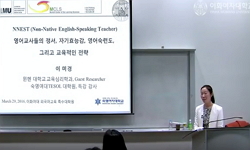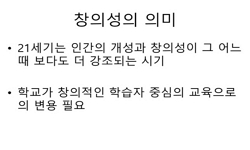This study investigated the manner in which emotion, openness to experience and self-efficacy related to creativity and explored the mediating role of self-efficacy in emotion-creativity and personality-creativity relationships. The participants of th...
http://chineseinput.net/에서 pinyin(병음)방식으로 중국어를 변환할 수 있습니다.
변환된 중국어를 복사하여 사용하시면 됩니다.
- 中文 을 입력하시려면 zhongwen을 입력하시고 space를누르시면됩니다.
- 北京 을 입력하시려면 beijing을 입력하시고 space를 누르시면 됩니다.

예비유아교사의 정서, 경험에의 개방성 및 자기효능감과 창의성 간의 관계 -자기효능감의 매개효과- = Emotions, Openness to Experience, Self-efficacy and Creativity: The mediating role of self-efficacy
한글로보기https://www.riss.kr/link?id=A104584761
-
저자
김경은 (남서울대학교)

- 발행기관
- 학술지명
- 권호사항
-
발행연도
2011
-
작성언어
Korean
-
주제어
pre-service kindergarten teachers ; emotion ; openness to experience ; self-efficacy ; creativity ; self-regulation ; mediating effect ; SEM ; 창의성 ; 정서 ; 자기효능감 ; 매개모형검증 ; 구조방정식 ; pre-service kindergarten teachers ; emotion ; openness to experience ; self-efficacy ; creativity ; self-regulation ; mediating effect ; SEM
-
등재정보
KCI등재
-
자료형태
학술저널
- 발행기관 URL
-
수록면
1-18(18쪽)
-
KCI 피인용횟수
37
- 제공처
- 소장기관
-
0
상세조회 -
0
다운로드
부가정보
다국어 초록 (Multilingual Abstract)
This study investigated the manner in which emotion, openness to experience and self-efficacy related to creativity and explored the mediating role of self-efficacy in emotion-creativity and personality-creativity relationships. The participants of this study were 187 pre-service kindergarten teachers enrolled in the the Department of Early Childhood Education and the Child Study from around the Seoul Greater Metropolitan area. The results revealed that positive emotions related positively to openness to experience, self-efficacy and creativity but in contrast, negative emotions related negatively to openness to experience, self-efficacy and creativity. Openness to experience related positively to self-efficacy and creativity and self-efficacy related positively to creativity. Furthermore, self-regulation was found to mediate the effects of positive emotions and openness to experience on pre-service kindergarten teachers' creativity. The influence of positive emotions and openness to experience on pre-service kindergarten teachers' creativity occurred indirectly through the facilitation of self-efficacy. The importance of positive emotions, openness to experience and self-efficacy to predict pre-service kindergarten teachers is also discussed.
참고문헌 (Reference)
1 김정택, "특성불안과 사회성과의 관계: Spielberger의 STAI를 중심으로" 고려대학교 대학원 1978
2 김경은, "유아 창의성교육에 대한 부모와 교사의 요구도 조사" 10 : 167-187, 2006
3 대한신경정신의학회, "신경정신과학" 하나의학사 1998
4 김금미, "불안, 성별 및 지배성, 진보성이 사회문제 해결에 미치는 영향: 대학생을 중심으로" 한국여성심리학회 8 (8): 35-52, 2003
5 정옥분, "대학생의 정서 및 자기조절능력과 창의성 간의 관계" 한국인간발달학회 16 (16): 171-190, 2009
6 김중술, "다면적 인성검사" 서울대학교 출판부 2001
7 교육인적자원부, "개정 유치원교육과정. 교육인적자원부 고시 제2007-153"
8 George, J. M., "When openness to experience and conscientiousness are related to creative behavior: An interactional approach" 86 (86): 513-524, 2001
9 Davis, M. A., "Understanding the relationship between mood and creativity: A meta-analysis" 108 (108): 25-38, 2009
10 McGregor, J., "The world's most innovative companies" 62-74, 2006
1 김정택, "특성불안과 사회성과의 관계: Spielberger의 STAI를 중심으로" 고려대학교 대학원 1978
2 김경은, "유아 창의성교육에 대한 부모와 교사의 요구도 조사" 10 : 167-187, 2006
3 대한신경정신의학회, "신경정신과학" 하나의학사 1998
4 김금미, "불안, 성별 및 지배성, 진보성이 사회문제 해결에 미치는 영향: 대학생을 중심으로" 한국여성심리학회 8 (8): 35-52, 2003
5 정옥분, "대학생의 정서 및 자기조절능력과 창의성 간의 관계" 한국인간발달학회 16 (16): 171-190, 2009
6 김중술, "다면적 인성검사" 서울대학교 출판부 2001
7 교육인적자원부, "개정 유치원교육과정. 교육인적자원부 고시 제2007-153"
8 George, J. M., "When openness to experience and conscientiousness are related to creative behavior: An interactional approach" 86 (86): 513-524, 2001
9 Davis, M. A., "Understanding the relationship between mood and creativity: A meta-analysis" 108 (108): 25-38, 2009
10 McGregor, J., "The world's most innovative companies" 62-74, 2006
11 Henessey, B. A., "The role of environment in creativity, In The nature of creativity" Cambridge University Press 11-38, 1988
12 Higgins, L. F., "The role of emotions in employee creativity" 26 : 119-129, 1992
13 Adler, P. S., "The role of affect in creative projects and exploratory search" 16 (16): 19-50, 2007
14 Nonaka, I, "The knowledge-creating company" 96-104, 1991
15 Isen, A. M, "The influence of positive affect on clinical problem solving" 11 : 221-227, 1991
16 Hartman, R. O., "The five-factor model and career self-efficacy: general and domain-specific relationships" 15 : 145-161, 2007
17 Gute, G., "The early lives of highly creative persons: The influence of the complex family" 20 (20): 343-357, 2008
18 Goldberg, L. R., "The development of markers of the Big-Five factor structure" 4 : 26-42, 1992
19 Baer, M., "The curvilinear relation between experienced creative time pressure and creativity: Moderating effects of openness to experience and support for creativity" 91 : 963-970, 2006
20 Lyubomirsky, S., "The benefits of frequent positive affect: Does happiness lead to success" 131 : 803-855, 2005
21 Mednick, S. A., "The associative basis of the creative process" 69 : 220-232, 1962
22 Sherer, M., "The Self-Efficacy Scale: Construction and validation" 51 : 663-671, 1982
23 Chang, C. H., "The Relationships among Job Stress, Job Satisfaction, Self-Efficacy, and Creativity"
24 Hills, P., "The Oxford Happiness Questionnaire: A compact scale for the. measurement of psychological well-being" 33 : 1071-1082, 2002
25 Kumar, V. K., "The Creativity Styles Questionnaire- Revised" 10 (10): 51-58, 1997
26 Kagan, J., "Temperamental contributions to social behavior" 44 : 668-674, 1989
27 Comunian, A. L., "Some characteristics of relations among de- pression, anxiety, and self-efficacy" 69 : 755-764, 1989
28 Bandura A., "Social cognitive theory: An agentic perspective" 52 : 1-26, 2001
29 Bandura, A., "Self-efficacy: The exercise of control" Freeman 1997
30 Schack, G. D., "Self-efficacy and creative productivity: Three studies of above average ability children" 1 : 44-52, 1991
31 Barron, F., "Putting creativity to work, In The nature of creativity: Contemporary psychological perspectives" Cambridge University Press 1988
32 Probst, T. M., "Productivity, counter productivity and creativity: The ups and downs of job insecurity" 80 : 479-497, 2007
33 Seligman, M. E. P., "Positive psychology: An introduction" 55 : 5-14, 2000
34 Silvia, P. J., "Openness to experience, plasticity, and creativity: Exploring lower-order, higher-order, and interactive effects" 43 : 1087-1090, 2009
35 Peterson, J. B., "Openness and extraversion are associated with reduced latent inhibition: Replication and commentary" 33 : 1137-1147, 2002
36 Barron, F., "No rootless flower: An ecology of creativity" Hampton 1995
37 Kavanagh, D. J., "Mood and self-efficacy: Impact of joy and sadness on perceived capabilities" 9 : 507-525, 1985
38 Burke, L. A., "Moderators of the openness to experience-performance relationship" 17 : 712-721, 2002
39 Spielberger, C. D., "Manual for the state-trait anxiety. inventory (self-evaluation questionnaire)" Consulting Psychologists. Press 1970
40 Caprara, G. V., "Looking for adolescents’ well-being: Self-efficacy beliefs as determinants of positive thinking and happiness" 15 : 30-43, 2006
41 Choi, J. N., "Individual and contextual predictors of creative performance: The mediating role of psychological processes" 16 : 187-199, 2004
42 Andrews, J., "In search of the marketing imagination: Factors affecting the creativity of marketing programs for mature products" 33 : 174-187, 1996
43 Thompson, L., "Improving the creativity oforganizational work groups" 17 : 96-109, 2003
44 Csikszentmihalyi, M., "Flow: The psychology of optimal experience" Harper & Row 1990
45 Richards, R., "Everyday creativity and new views of human nature" American Psychological Press 2007
46 Averill, J. R, "Emotions as mediators and as products of creative activity, In Creativity across domains: Faces of the muse" Erlbaum 225-243, 2005
47 Runco, M. A., "Eminent creativity, everyday creativity, and health" Ablex. Simonton 1998
48 Runco, M. A., "Development and psycho-metric integrity of a measure of ideational behavior" 13 : 393-400, 2001
49 Bandura, A., "Cultivating competence, self-efficacy, and intrinsic interest through proximal self-motivation" 41 : 586-598, 1981
50 Levin, C., "Creativity in the school context" Land University 2008
51 Cropley, A. J., "Creativity in education & learning" Kogan page 2001
52 Tierney, P., "Creative self-efficacy: Its potential antecedents and relationship to creative performance" 45 : 1137-1148, 2002
53 Beghetto, R. A., "Creative self-efficacy: Correlates in middle and secondary students" 18 : 447-457, 2006
54 McCrae, R. R., "Conceptions and correlates of openness to experience, In Handbook of personality psychology" Academic Press 825-847, 1997
55 Sternberg, R. J., "Buy low and sell high: An investment approach to creativity" 1 : 1-5, 1992
56 Seligman, M. E. P., "Authentic Happiness: Using the New Positive Psychology to Realize Your Potential for Lasting Fulfillment" Free Press 2002
57 Amabile, T. M., "Affect and Creativity at Work" 50 : 367-403, 2005
58 Ford, C., "A theory of individual creative action in multiple social domains" 21 : 1112-1142, 1996
59 Feist, G. J., "A meta-analysis of personality in scientific and artistic creativity" 2 : 290-309, 1998
60 Shaw, J. M., "A Model for Training Teachers to Encourage Divergent Thinking in Young Children" 20 (20): 81-88, 1986
61 유태용, "5요인 성격검사의 개발 및 타당화 연구" 10 (10): 85-102, 1997
동일학술지(권/호) 다른 논문
-
다자녀가족 부부와 개인의 다자녀가족 강점지각에 관한 연구 - 근거이론적 접근을 중심으로 -
- 한국인간발달학회
- 임춘희
- 2011
- KCI등재
-
아버지의 양육태도, 학령기 여아의 성역할 고정관념 및 내적동기가 여아의 유능성에 미치는 영향
- 한국인간발달학회
- 하수정
- 2011
- KCI등재
-
영아기 정서와 기질, 유아기 어머니의 긍정적 양육태도와 4세 유아의 또래상호작용의 질
- 한국인간발달학회
- 정옥분
- 2011
- KCI등재
-
그림책 비디오를 활용한 문제해결 프로그램이 유아의 창의성 증진에 미치는 영향
- 한국인간발달학회
- 윤정진
- 2011
- KCI등재
분석정보
인용정보 인용지수 설명보기
학술지 이력
| 연월일 | 이력구분 | 이력상세 | 등재구분 |
|---|---|---|---|
| 2027 | 평가예정 | 재인증평가 신청대상 (재인증) | |
| 2021-01-01 | 평가 | 등재학술지 유지 (재인증) |  |
| 2018-01-01 | 평가 | 등재학술지 유지 (등재유지) |  |
| 2015-01-01 | 평가 | 등재학술지 유지 (등재유지) |  |
| 2011-01-01 | 평가 | 등재학술지 유지 (등재유지) |  |
| 2009-01-01 | 평가 | 등재학술지 유지 (등재유지) |  |
| 2006-01-01 | 평가 | 등재학술지 선정 (등재후보2차) |  |
| 2005-01-01 | 평가 | 등재후보 1차 PASS (등재후보1차) |  |
| 2004-01-01 | 평가 | 등재후보학술지 유지 (등재후보1차) |  |
| 2003-01-01 | 평가 | 등재후보 1차 FAIL (등재후보1차) |  |
| 2001-07-01 | 평가 | 등재후보학술지 선정 (신규평가) |  |
학술지 인용정보
| 기준연도 | WOS-KCI 통합IF(2년) | KCIF(2년) | KCIF(3년) |
|---|---|---|---|
| 2016 | 1.88 | 1.88 | 1.8 |
| KCIF(4년) | KCIF(5년) | 중심성지수(3년) | 즉시성지수 |
| 1.85 | 2.02 | 2.36 | 0.43 |




 스콜라
스콜라







